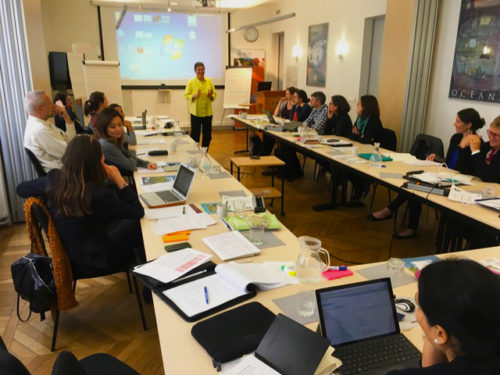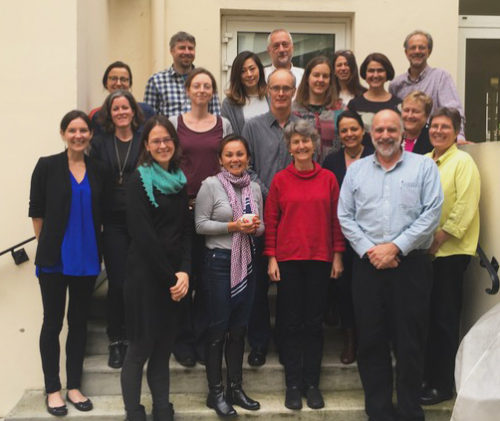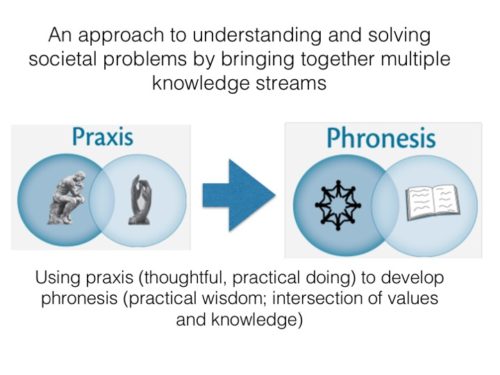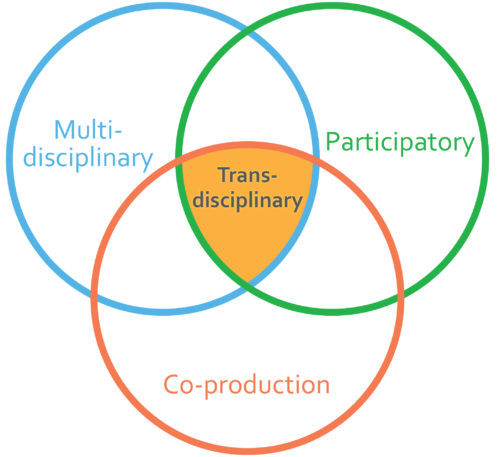Talking about Transdisciplinary research in Paris
Bill Dennison ·I attended a 'Transdisciplinary Research Meeting', sponsored by the International Council for Science (ICSU), which is part of UNESCO, and is based in Paris. The meeting was at the ICSU facility near the Arc de Triomphe. Our local host was Vivi Stavrou, from the International Social Science Council (ISSC). Participants came from four continents (North and South America, Europe and Africa), and they all had a keen interest in transdisciplinary research.
The following people attended the meeting: Mathieu Denis (International Council for Science, Paris), Sarah Moore (ISSC, Paris), Katsia Paulavets (ICSU, Paris), Mao Takeuchi (Belmont Forum Secretariat, Paris), Christina Cook (Future Earth Secretariat, Montreal), Jon Padgham (Future Earth and START, Boulder, Colorado), Sarah Schweizer (START, Washington, D.C.), Holm Tiessen (Inter-American Institute, Montevideo, Uruguay), Marcella Ohira (Inter-American Institute, Montevideo, Uruguay), Ulli Vilsmaier (Luneburg University, Germany), John van Breda (Stellenbosch University, South Africa), Tobias Buser (TDnet; Swiss Academies of Science, Zurich), Flurina Schneider (University of Bern, Switzerland), Gabriela Wuelser (TdLab; Swiss Academies of Science, Zurich), Carolina Adler (TdLab), Susi Moser (Susanne Moser Research & Consulting, California), Margaret Krebs (Leopold Leadership Program, California), Coleen Vogel, (Future Earth Africa, University of Witwatersrand, South Africa). In addition, Erica Key, from the Belmont Forum Secretariat was connected via phone from Louisiana.

The workshop was well paced, with long breaks and lunches, allowing time to get to know one another. Needless to say, the food was superb. Vivi and Susi did most of the facilitating, but they were very inclusive about involving all participants. The aim of the meeting was to advance collaborative efforts for transdisciplinary research. In addition, there was a need to develop a working definition of transdisciplianry research and outline a proposal to develop a training program for transdisciplinary research. We spent the first day getting to know the participating organizations, and then the second and third days developing definitions of transdisciplinary research and outlining elements of a training program.

During the second day, I was pleasantly surprised that the participants were using the Greek term 'praxis', which is one of my favorite words, described in a previous blog. So for the end of the second day, I composed the following poem:
Rediscovering the Greeks in Paris
16 February 2017

We traveled from afar to gather in gay Paree
To talk about what it is to be transdisciplinary
After many rounds of discussion
With sometimes contentious conversation.
We shared many different approaches and techniques
But we found ourselves harking back to the Greeks
Discovering that Aristotle had it right from the start
So we could use his words to sound quite smart.
Praxis, translated as thoughtful, practical doing
Offers us a way of proceeding
To achieve phronesis, or practical wisdom
Which is a way to understand a system.
Connecting values with knowledge
Learning that goes beyond college
So in end we came back to the Greeks
To explain our transdisciplinary techniques.
And then after the final day, we talked about when and when not to employ transdisciplinary research. This led me to paraphrase Hamlet with this soliloquy, using the abbreviation 'TD' for transdisciplinary:
To TD, or not to TD
17 February 2017
To TD, or not to TD, that is the question:
Whether 'tis nobler in the mind to suffer
The slings and arrows of outrageous disciplines,
Or to take Arms against a Sea of troubles,
And by opposing end them: to try, to study
No more; and by a study, to say we end
the heart-ache, and the thousand natural shocks
that science is heir to? 'Tis a consummation
devoutly to be wished. To try, to study,
To solve, perchance to Dream; aye, there's the rub,
for in that solving of problems, what dreams may come,
when we have shuffled off this mortal coil,
must give us pause.
I also decided that transdisciplinary research needed better publicity, thus I proposed a transdisciplinary flag and anthem. The flag design was based on the Venn diagram that integrated the elements of multidisciplinary, participatory, and co-creation of knowledge. The anthem was adapted from the French National Anthem, La Marseillaise, using the same tune:
Transdisciplinary Anthem
17 Feb 2017

Arise, champions of transdisciplinarity
Our day of glory has arrived
Against us stands disciplines
Narrowness we need to repel
Narrowness we need to repel
Do you hear, in the countryside
The roar of our countless stakeholders?
They're coming right into your arms
To co-design projects and problem solve!
To arms, citizens!
Form your TD teams
Let's march, let's march
Let our partners in
Create solutions!
To arms, citizens!
Form your TD teams
Let's march, let's march
Let our partners in
Create solutions!
Coming into this meeting, I think that I was the least 'connected' person, as most participants knew one another from previous encounters and their organizations had well established connections. Part of the reason is that I had never self-identified myself as a transdisciplinary researcher, even though I have indeed been an active transdisciplinary practitioner once I learned what people were talking about when they called for transdisciplinary research. I was happy to discover this eclectic group of people and look forward to joining in the effort to form a global transdisciplinary collaborative.
About the author
Bill Dennison

Dr. Bill Dennison is a Professor of Marine Science and Interim President at the University of Maryland Center for Environmental Science (UMCES).